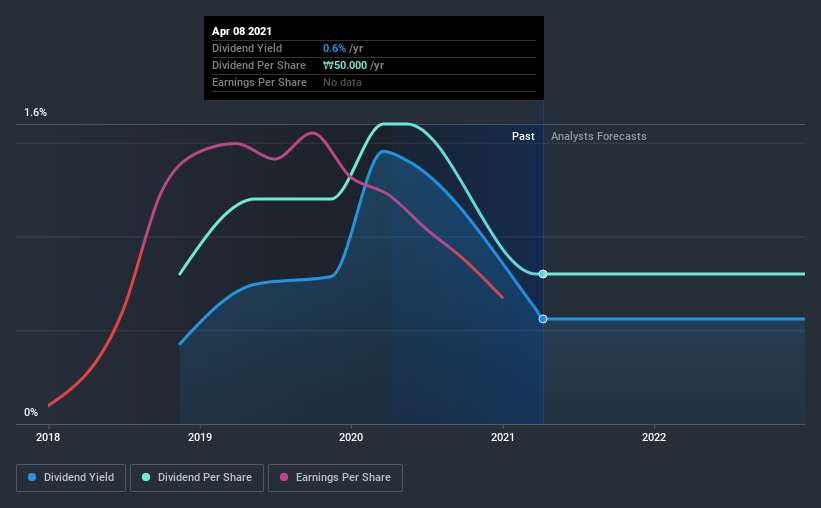- South Korea
- /
- Machinery
- /
- KOSDAQ:A023160
Is Tae Kwang Corporation (KOSDAQ:023160) A Good Fit For Your Dividend Portfolio?

Is Tae Kwang Corporation (KOSDAQ:023160) a good dividend stock? How can we tell? Dividend paying companies with growing earnings can be highly rewarding in the long term. Yet sometimes, investors buy a popular dividend stock because of its yield, and then lose money if the company's dividend doesn't live up to expectations.
With only a two-year payment history, and a 0.6% yield, investors probably think Tae Kwang is not much of a dividend stock. While it may not look like much, if earnings are growing it could become quite interesting. Some simple research can reduce the risk of buying Tae Kwang for its dividend - read on to learn more.
Explore this interactive chart for our latest analysis on Tae Kwang!

Payout ratios
Companies (usually) pay dividends out of their earnings. If a company is paying more than it earns, the dividend might have to be cut. Comparing dividend payments to a company's net profit after tax is a simple way of reality-checking whether a dividend is sustainable. Although Tae Kwang pays a dividend, it was loss-making during the past year. When a company is loss-making, we next need to check to see if its cash flows can support the dividend.
Tae Kwang's cash payout ratio last year was 8.7%, which is quite low and suggests that the dividend was thoroughly covered by cash flow.
With a strong net cash balance, Tae Kwang investors may not have much to worry about in the near term from a dividend perspective.
We update our data on Tae Kwang every 24 hours, so you can always get our latest analysis of its financial health, here.
Dividend Volatility
One of the major risks of relying on dividend income, is the potential for a company to struggle financially and cut its dividend. Not only is your income cut, but the value of your investment declines as well - nasty. It has only been paying dividends for a few short years, and the dividend has already been cut at least once. This is one income stream we're not ready to live on. Its most recent annual dividend was ₩50.0 per share, effectively flat on its first payment two years ago.
We're glad to see the dividend has risen, but with a limited rate of growth and fluctuations in the payments, we don't think this is an attractive combination.
Dividend Growth Potential
With a relatively unstable dividend, it's even more important to see if earnings per share (EPS) are growing. Why take the risk of a dividend getting cut, unless there's a good chance of bigger dividends in future? Strong earnings per share (EPS) growth might encourage our interest in the company despite fluctuating dividends, which is why it's great to see Tae Kwang has grown its earnings per share at 26% per annum over the past three years.
Conclusion
When we look at a dividend stock, we need to form a judgement on whether the dividend will grow, if the company is able to maintain it in a wide range of economic circumstances, and if the dividend payout is sustainable. We're a bit uncomfortable with the company paying a dividend while being loss-making, although at least the dividend was covered by free cash flow. Next, earnings growth has been good, but unfortunately the dividend has been cut at least once in the past. In sum, we find it hard to get excited about Tae Kwang from a dividend perspective. It's not that we think it's a bad business; just that there are other companies that perform better on these criteria.
It's important to note that companies having a consistent dividend policy will generate greater investor confidence than those having an erratic one. However, there are other things to consider for investors when analysing stock performance. Now, if you want to look closer, it would be worth checking out our free research on Tae Kwang management tenure, salary, and performance.
If you are a dividend investor, you might also want to look at our curated list of dividend stocks yielding above 3%.
When trading Tae Kwang or any other investment, use the platform considered by many to be the Professional's Gateway to the Worlds Market, Interactive Brokers. You get the lowest-cost* trading on stocks, options, futures, forex, bonds and funds worldwide from a single integrated account. Promoted
Valuation is complex, but we're here to simplify it.
Discover if Tae Kwang might be undervalued or overvalued with our detailed analysis, featuring fair value estimates, potential risks, dividends, insider trades, and its financial condition.
Access Free AnalysisThis article by Simply Wall St is general in nature. It does not constitute a recommendation to buy or sell any stock, and does not take account of your objectives, or your financial situation. We aim to bring you long-term focused analysis driven by fundamental data. Note that our analysis may not factor in the latest price-sensitive company announcements or qualitative material. Simply Wall St has no position in any stocks mentioned.
*Interactive Brokers Rated Lowest Cost Broker by StockBrokers.com Annual Online Review 2020
Have feedback on this article? Concerned about the content? Get in touch with us directly. Alternatively, email editorial-team (at) simplywallst.com.
About KOSDAQ:A023160
Tae Kwang
Manufactures, supplies, and sells butt weld pipe fittings for oil and gas, chemical and petrochemical, power plant, and shipbuilding businesses in Korea and internationally.
Flawless balance sheet and undervalued.
Similar Companies
Market Insights
Community Narratives



